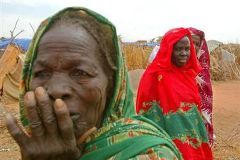Darfur displaced remain in camps, demand militias disarmament
July 24, 2006 (ZAM ZAM, North Darfur) — Almost three months after a partial peace deal was signed, the hundreds of thousands of displaced civilians in Darfur remain unwilling to go home until the Sudanese government’s Janjaweed proxy militia has been disarmed.

|
|
Displaced women stand in the Zam Zam refugee camp. |
A committee of elders representing the 43,000 people crammed into Zam Zam camp in North Darfur state heads to a routine meeting with an official from the African Union Mission in Sudan (AMIS).
“We will stay in Zam Zam until security is restored, and to achieve that the Janjaweed need to be disarmed,” says one of them, Sheikh Ali Mohammed Fadul.
Sheikh Hassan, the most senior of the trio of local notables, is equally determined as he heads to the meeting.
“We want guarantees, we want the presence of an international contingent for a real peacekeeping operation. African Union (AU) forces are not enough,” he says.
An agreement was signed between Khartoum and the main faction of the rebel Sudan Liberation Movement (SLM) on May 5 in Abuja, raising hopes of an end to the more than three-year-old civil conflict in Darfur.
Thousands of people were killed and hundreds of thousands displaced in the scorched earth campaign led by the government and its proxy militia in response to an uprising by rebels demanding a bigger share of the country’s resources.
Successive ceasefire agreements backed by the international community have demanded the Janjaweed — accused of genocide by Washington — be disarmed.
Khartoum submitted a plan for disbanding its militia earlier this month but it has not yet been unveiled and its implementation could prove difficult.
Darfur is populated mainly by pastoralist tribes which, whether pro-government or pro-rebel, have traditionally used weapons to protect their herds.
“The massacres have continued since Abuja,” says Mohammed Beshir, who represents the rebel Justice and Equality Movement at AMIS’s ceasefire commission.
Daniel Moenyana, who heads the AMIS civil police force, acknowledges that violence has continued to plague western Sudan since the signing of the Abuja peace agreement.
“There is still a lot of insecurity in Darfur but we cannot talk of massacres perpetrated by the Janjaweed or the Sudanese armed forces,” he says.
Khartoum’s refusal so far to bow to international calls for the deployment of UN peacekeepers in place of the embattled AU force has only heightened the level of suspicion among holdout rebel factions, including JEM and a dissident branch of the SLM.
“The disarmament of the Janjaweed is a priority but it has to be done under the supervision of international forces. Only they can protect the population, we have lost faith in the the AU, which is no longer neutral and has been siding with the government since Abuja,” Beshir says.
Several European observers working on the ground with AMIS argue that even if the Janjaweed were disarmed, the latest violence in Darfur indicates that clashes would continue in the region.
At least 60 people were killed in South Darfur state last week when fighting broke out between two rival tribes over pasture.
A Sudanese civilian employed by AMIS could not foresee any improvement in the near future.
“In fact, they don’t want to go home,” he says pointing to the refugees in Zam Zam camp.
“Here they have water, food, schools and doctors. In addition, the rebels need them to pressure the Sudanese government. They could go home any time but they will be here for a while.”
